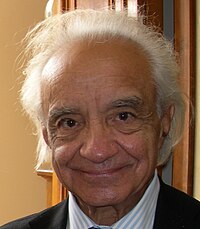Antonino Zichichi: Difference between revisions
Tagging 3 dead links using Checklinks |
No edit summary |
||
| Line 3: | Line 3: | ||
==Biography== |
==Biography== |
||
he strongly believes. |
|||
Zichichi was born in [[Trapani]], [[Sicily]], in 1929. He has collaborated to several important discoveries in the field of subnuclear physics and has worked in some of the most important research laboratories in the world ([[Fermilab]] in Chicago, [[CERN]] in Geneva, etc.). He is known to the Italian public, above all, for his popularizations of scientific ideas, both as the author of numerous books and essays and because of his appearances on television programs of RAI television. In this work of popularization, the Sicilian scientist places great emphasis, above all, on trying to demonstrate that there is no contrast between science and the Catholic faith in which he strongly believes. |
|||
In 1963 he founded the ''Centro Ettore Majorana'' of [[Erice]], dedicated to scientific culture. |
In 1963 he founded the ''Centro Ettore Majorana'' of [[Erice]], dedicated to scientific culture. |
||
Revision as of 02:21, 22 July 2011

Antonino Zichichi (born October 15, 1929) is an Italian physicist who has worked in the field of nuclear physics.
Biography
he strongly believes.
In 1963 he founded the Centro Ettore Majorana of Erice, dedicated to scientific culture.
He has been president of the Istituto Nazionale di Fisica Nucleare from 1977 up to 1982 and in 1980 he strongly backed the creation of the Laboratori Nazionali del Gran Sasso. Currently, he is an emeritus professor of physics at the University of Bologna. He is president of the World Federation of Scientists, an organization concerned with the fight against planetary emergencies.[1] He is an ISI highly cited researcher.[2]
Zichichi was at the center of a diplomatic incident during the elections for director of CERN: a letter from the Ministry of Research nominated him for the post, since there was an informal rotation of seats taking place. But the pressure brought to bear on the part of Italy in favor of Zichichi caused a sharp break at CERN between Italy and the supporters of other candidates. The candidacy of Zichichi was rejected by 12 votes and a German, Herwig F. Schopper, was elected in his place. The Italian government threatened to retaliate by cutting its funding of CERN, passing to the status of non-contributing observer nation.
Another incident involving Zichichi concerned a Eucharistic pantomime which took place at L'Aquila, where a chorus of students begged Zichichi to explain the mysteries of the atom, after which there followed a conference. The episode caused another rupture: he was sharply criticized by one large section of the University heads, and appreciated by another, with the particular support of the leaders of the Christian Democrats, the party to which Zichichi was always tied.
In his essay L'irresistibile fascino del tempo ("The Irresistible Fascination of Time") he cites the rule of the "Perfect Calendar" in an attempt to improve on the Gregorian Calendar by eliminating three days every 10,000 years. In this system, the days of the year are 365, plus one every four years, minus three every four centuries, and minus three every 10,000 years. Zichichi therefore accepts the idea of not considering as leap years the years 4,000, 8,000 and 12,000 which, according to the Gregorian calendar, would be. It should be recalled that the definition of a high-precision calendar (superior to the Gregorian) has been studied at various times and places: in particular, the Persian calendar defined in the 11th century is very precise and one was created by Milutin Milanković at the request of the orthodox church.
Popularization and criticism
Zichichi is regarded as an effective communicator who succeeded in focusing attention on the scientific world in the Italian media. However, he has been criticized from many quarters for his biased views. In his book on Galileo, Galilei, Divin Uomo: as many book reviewers have pointed out, this is a book with an ideological agenda, in which objectivity is sacrificed to the demonstration of the thesis that Galileo was a deeply committed Catholic more than a scientist and was therefore willing to renounce his scientific convinctions for his faith.[citation needed]
Elio Fabri, professor of Physics at Pisa, Enrico Bellone, professor of the history of science at the University of Milan and Piergiorgio Odifreddi, mathematician at Cornell University and at the University of Turin, have all criticized his essays both with regard to form and with regard to contents (often pointing out errors in the scientific part itself). Odifreddi has even been sued by Zichichi for defamation for having pointed out the numerous contradictions in his writings in an article entitled "Zichicche" (a portmanteau word from "Zichichi" and the Italian "chicche", meaning "interesting bits"), which later became a book consisting of a collection of writings about Zichichi by various people. There is a preface written by Giulio Andreotti.
Zichichi has called global warming models "incoherent and invalid".[3]
Publications
- Zichichi, A., Perché io credo in Colui che ha fatto il mondo, Il Saggiatore
- Zichichi, A., L'irresistibile fascino del Tempo, Mondadori
- Zichichi, A., L'infinito, Il Saggiatore
- Zichichi, A., Galilei divin uomo, Il Saggiatore
- Zichichi, A., Il Vero e il Falso, Il Saggiatore
See also
References
- ^ "The World Federation of Scientists home page". WFS. Retrieved 2008-07-14.
- ^ "ISI Highly Cited: Antonino Zichichi". Institute for Scientific Information. Retrieved July 23, 2010.
- ^ Forbes http://blogs.forbes.com/digitalrules/2008/06/wikipedia-censors-global-warming-skeptics/.
{{cite news}}: Missing or empty|title=(help)
Further reading
- Odifreddi, P., Zichicche, Dedalo, 2003 ISBN 88-220-6260-4
External links
- Book review by Enrico Bellone[dead link], Professor of the History of Science at the University of Padova.
- Galilei Divin Uomo: Book review by Elio Fabri, professor of physics at the University of Pisa. Part I and Part II
- Official Biography of Zichichi at the Ettore Majorana Foundation
- Zichicche I[dead link] and *II[dead link] of Piergiorgio Odifreddi (Book review)
